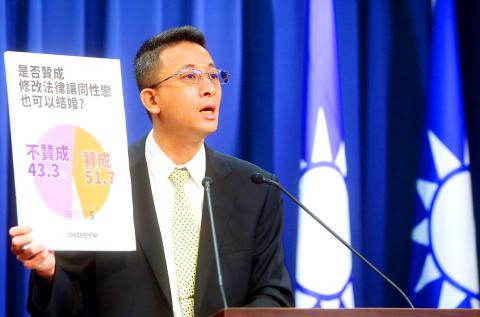More than half of Taiwanese are in favor of legalizing same-sex marriage, but lean toward the promulgation of a new act to achieve the goal, according to a survey released yesterday by the Chinese Nationalist Party (KMT), which called for public hearings to be held to solicit more opinions.
The poll, conducted on Tuesday and Wednesday last week by Trend Survey and Research at the behest of the KMT, found that 51.7 percent of respondents supported amendments aimed at legalizing homosexual unions, compared with 43.3 percent who disapproved.
As for the issue of how to legalize same-sex marriage, 53.3 percent of those polled said they preferred promulgating a “civil partnership bill,” while 32.2 percent said they favored amending the Civil Code.

Photo: CNA
Only 0.4 percent of the respondents supported both approaches, with 4.9 percent liking neither, the survey showed.
Among the respondents 64.1 percent said they think that having a separate law would not discriminate against homosexuals; 25.5 percent said it would be a problem, while 63.3 percent said that legislative efforts should only be made after supplementary measures were put in place — given that amendments to the Civil Code could involve a wide range of legal rights — and 21.4 percent disagreed.
The poll asked respondents whether they could accept the removal of the terms “husband and wife,” “man and woman,” and “father and mother” from government documents, with 54 percent saying they did not approve and 39.6 percent saying it would be acceptable.
A majority said that marriage as it has been defined throughout history is conducive to the public interest, with 52.2 percent agreeing that procreation is central to the institution, which would exclude same-sex couples from marriage because they cannot bear children without a third party.
Forty percent said that the definition of marriage did hold procreation as a central tenet.
When it came to homosexual family members, 48.7 percent said they could not accept such a situation, while 46.1 percent said they could.
The survey collected 1,070 valid samples.
It has a confidence level of 95 percent and a margin of error of 3 percentage points.
KMT Culture and Communications Committee Deputy Director Hu Wen-chi (胡文琦) said that as opponents of same-sex marriage have resorted to various channels to express their opinions, the issue requires a much more extensive discussion to reach a higher level of public consensus.
“The government should hold more public hearings to ensure that the issue is fully discussed,” Hu said, urging the Democratic Progressive Party (DPP) to refrain from playing “good cop, bad cop” to fool the public, an apparent reference to DPP caucus whip Ker Chien-ming’s (柯建銘) remarks last week that the DPP was leaning toward enacting a separate bill, which prompted DPP Legislator Tuan Yi-kang (段宜康) to say that “Ker’s personal view dos not represent that of the DPP as a whole.”

Chinese Nationalist Party (KMT) Chairman Eric Chu (朱立倫), spokeswoman Yang Chih-yu (楊智伃) and Legislator Hsieh Lung-chieh (謝龍介) would be summoned by police for questioning for leading an illegal assembly on Thursday evening last week, Minister of the Interior Liu Shyh-fang (劉世芳) said today. The three KMT officials led an assembly outside the Taipei City Prosecutors’ Office, a restricted area where public assembly is not allowed, protesting the questioning of several KMT staff and searches of KMT headquarters and offices in a recall petition forgery case. Chu, Yang and Hsieh are all suspected of contravening the Assembly and Parade Act (集會遊行法) by holding

PRAISE: Japanese visitor Takashi Kubota said the Taiwanese temple architecture images showcased in the AI Art Gallery were the most impressive displays he saw Taiwan does not have an official pavilion at the World Expo in Osaka, Japan, because of its diplomatic predicament, but the government-backed Tech World pavilion is drawing interest with its unique recreations of works by Taiwanese artists. The pavilion features an artificial intelligence (AI)-based art gallery showcasing works of famous Taiwanese artists from the Japanese colonial period using innovative technologies. Among its main simulated displays are Eastern gouache paintings by Chen Chin (陳進), Lin Yu-shan (林玉山) and Kuo Hsueh-hu (郭雪湖), who were the three young Taiwanese painters selected for the East Asian Painting exhibition in 1927. Gouache is a water-based

Taiwan would welcome the return of Honduras as a diplomatic ally if its next president decides to make such a move, Minister of Foreign Affairs Lin Chia-lung (林佳龍) said yesterday. “Of course, we would welcome Honduras if they want to restore diplomatic ties with Taiwan after their elections,” Lin said at a meeting of the legislature’s Foreign Affairs and National Defense Committee, when asked to comment on statements made by two of the three Honduran presidential candidates during the presidential campaign in the Central American country. Taiwan is paying close attention to the region as a whole in the wake of a

OFF-TARGET: More than 30,000 participants were expected to take part in the Games next month, but only 6,550 foreign and 19,400 Taiwanese athletes have registered Taipei city councilors yesterday blasted the organizers of next month’s World Masters Games over sudden timetable and venue changes, which they said have caused thousands of participants to back out of the international sporting event, among other organizational issues. They also cited visa delays and political interference by China as reasons many foreign athletes are requesting refunds for the event, to be held from May 17 to 30. Jointly organized by the Taipei and New Taipei City governments, the games have been rocked by numerous controversies since preparations began in 2020. Taipei City Councilor Lin Yen-feng (林延鳳) said yesterday that new measures by